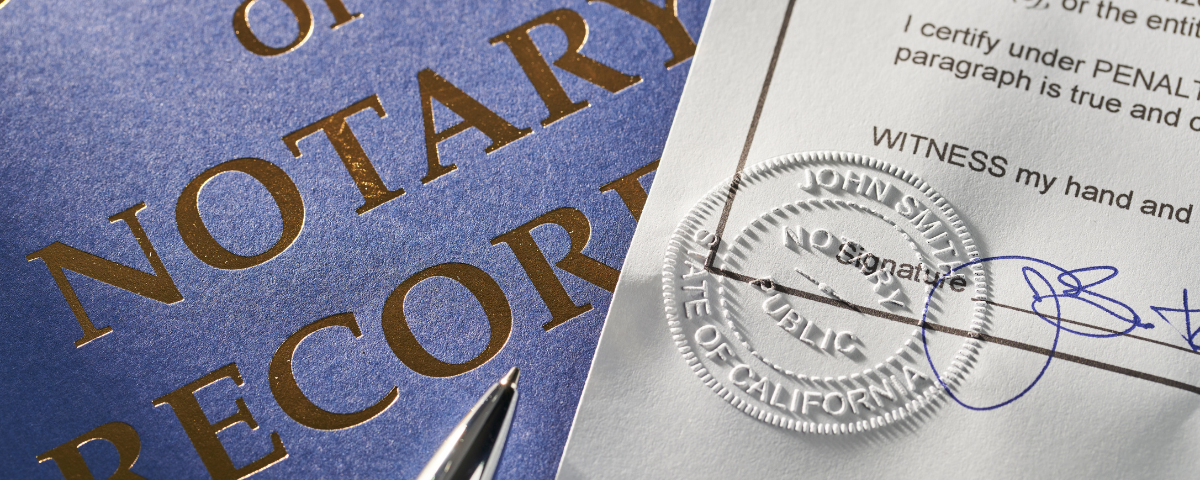Disclaimer: This blog post is for informational purposes only and does not constitute legal advice. Please consult an attorney for guidance on specific laws regarding Remote Online Notarization (RON), digital signatures, and related legal matters. As laws concerning RON and notarization are subject to frequent changes, it is advisable to verify current regulations with your local government.
You’ve likely encountered these terms in real estate transactions or legal discussions. When you need something notarized electronically, you might see references to RON vs IPEN. While they may sound similar, these two approaches can differ significantly in their practical applications.
This confusion often leads to delays and frustration, particularly when deadlines are approaching. The RON vs IPEN decision typically comes down to understanding one key difference: where the signer needs to be physically located. This single factor may influence the technology requirements, identity verification methods, and overall process.
What are these methods, and how might you determine which approach could work for your document? These questions come up frequently because people generally want a straightforward, secure way to get their documents notarized without unnecessary complications. Let’s explore these options so you can make an informed choice for your needs.
Please note: Notarization laws vary significantly by state, and you should consult with a qualified attorney to understand the specific requirements in your jurisdiction before proceeding with any notarization method.
What is RON?
RON stands for Remote Online Notarization. As the name suggests, this approach typically allows the signer to appear before the notary using a secure platform that supports audio-visual technology, similar to a video call.
With RON, you and the notary may be in completely different locations. You could potentially be at home while the notary operates from their office in another state. This physical separation often defines the remote online notarization process and may set it apart from other forms of notarial acts.
The notarization process generally happens online. You might upload your documents, verify your identity through a multi-step process, and then apply electronic signatures to the document while on camera. The notary can witness this in real time and then apply their electronic seal and digital certificate to notarize the document.
These sessions are often recorded and stored, which can add a layer of security and provide a verifiable record of the event. This method of notarization has gained popularity because it may save time and offer convenience. A notary completes the act digitally, creating a final document that is entirely electronic.
Important: RON availability and requirements vary by state. You should verify that RON is legal in your state and consult with an attorney about specific legal requirements before proceeding.
What is IPEN?
IPEN stands for In-Person Electronic Notarization. The key aspect here is “in-person.” Unlike RON, everyone involved in the notarization typically needs to be present in the same physical location.
Think of it as a modern approach to traditional notarization. Instead of signing physical documents with ink, the document is signed electronically on a device. This could be a tablet or computer screen, potentially offering a more streamlined experience than paper-based notarization.
The notary is present with you, checking your physical ID as they traditionally have. After you sign electronically, the notary affixes their electronic seal to the digital document. There’s typically no video call or remote verification needed since everyone is present at the same physical location.
IPEN notarization differs from remote ink-signed notarization (RIN), where a signer on a video call might physically sign a paper document. With IPEN, both the document and the signature are often electronic, but the human interaction remains face-to-face. This can make it a suitable choice for transactions that start and finish in one location, such as at a bank or law office.
The Main Comparison: RON vs IPEN
Now that we understand each approach, let’s compare them side by side. Understanding their differences may help make your decision easier. It’s often not about which is universally better, but which might work better for your specific situation.
Location Requirements
The most significant difference is typically physical presence. With RON, the signer can potentially be anywhere in the world, as long as they have an internet connection and a camera to connect with a commissioned electronic notary.
This flexibility might be valuable for people who are traveling, serving in the military overseas, or involved in transactions with people in different states. It may help remove geographical barriers, potentially making it possible to notarize documents without travel requirements, having to find a notary or mailing the documents.
IPEN generally requires the opposite approach. All parties, including the notary public or signing agent, need to be physically present in the same room simultaneously. This keeps the transaction local, similar to standard in-person notarization. If you can easily meet in person, IPEN might be a suitable option, but if your signer is in a different location, it is not feasible.
Identity Verification Methods
Because the signer is not physically with the notary in RON, this method often requires robust identity verification processes. It typically involves a multi-part process that may be dictated by notary law. First, you’ll likely use your device’s camera to capture your government-issued photo ID, which the system may analyze for security features.
Second, there’s usually dynamic knowledge-based authentication (KBA), where you willmight answer personal questions pulled from public records.
Finally, the notary often visually compares you on the live video feed to the picture on your ID. These identity verification standards are generally designed to help prevent fraud when notarization takes place remotely.
With IPEN, identity verification typically follows traditional methods. You usually present your physical ID to the notary. The notary may inspect it for signs of tampering and confirm you are the person named in the document. It’s often straightforward because you’re physically present.
Technology Requirements
The technology needs for RON and IPEN often differ significantly. For a RON session, you’ll typically need a computer with a working camera and microphone. A stable internet connection is usually critical because the entire session is often a live video call that gets recorded.
For IPEN, the primary tool is generally an electronic signing device. This might be a tablet or signature pad where the signer will sign. The documents are often in digital format, but the human interaction remains physical, potentially blending modern efficiency with traditional practice.
Behind the scenes, the platforms for both services can be complex. For instance, in the real estate sector, this type of mortgage technology typically needs to be secure and compliant with industry regulations. The software should protect personal data and may help create a secure final document.
Record Keeping
Another key difference often lies in the records kept by the notary. For RON, state laws may require a secure audio-visual recording of the entire notarial act be kept for up tp 10-years. This recording can serve as evidence of a compliant signature, potentially protecting both the signer and the public.
The electronic journal entry for a RON transaction is often more detailed, sometimes capturing screenshots of the ID and other metadata. The final notarized document typically includes a notarial certificate with information about the remote notarial act. The notary’s electronic seal is usually cryptographically bound to the document.
For IPEN, record-keeping is often simpler. There’s typically no audio-visual recording required because the notarization occurred in person. The notary will usually still record the act in their electronic journal, but it most likely does not include a video file. This often makes the record-keeping more similar to traditional notarization, just in digital format.
| Feature | RON (Remote Online Notarization) | IPEN (In-Person Electronic Notarization) |
|---|---|---|
| Signer’s Location | Potentially anywhere in the world | Same physical room as the notary |
| ID Verification | KBA, ID analysis, live video comparison | Physical inspection of government ID |
| Required Tech | Computer, camera, mic, internet | Tablet or electronic signature pad (provided by Notary) |
| Session Record | Audio-visual recording and e-journal | Physical journal typically |
| Document Type | Digital documents only | Digital documents only |
| Best For | Long-distance, convenience, accessibility | Local transactions, face-to-face preference |
Remember: Laws vary by state, and you should consult with a qualified attorney to understand the specific requirements and limitations in your jurisdiction.
When RON Might Be Appropriate
RON can be particularly useful when distance is a factor. Consider a couple buying a house where one spouse is on a business trip, but closing documents need signatures today. A notary signing agent might use RON to allow them to sign from their hotel room, potentially saving the entire transaction.
It may also be helpful for people with mobility issues or those who live in remote areas far from a notary public. The convenience can be significant, potentially allowing you to notarize a document from your own home in minutes without travel requirements.
Businesses with national or international clients often benefit from RON. It may help speed up contract signings and other official paperwork, potentially removing delays associated with mailing documents. Any situation where signers are geographically separated might be a suitable use case for remote online notarization.
Ready to explore RON options? Contact NotaryCam today to learn about our software and services.
Where IPEN Could Make Sense
IPEN might be suitable when everyone can meet but wants the benefits of a digital process. For example, at a car dealership, bank branch, or title company office. The customer is already there, and documents can potentially be signed on a tablet and stored securely.
This approach may help avoid stacks of paper, potentially reduce errors from missing signatures, and could make document management easier. You might get the speed of electronic signatures without losing the personal interaction of a face-to-face meeting.
Some people may also be more comfortable with technology when someone is there to guide them. IPEN can allow a notary or professional to walk a signer through the process on the spot. It might serve as a middle ground between traditional paper methods and fully remote approaches, even for sensitive documents.
Legal Considerations and Notary Guidance
The legality of these notarization methods is typically governed by state law, which can vary significantly. RON has seen adoption in many states, with a majority having passed remote online notarization laws. However, the specific requirements for notaries and the types of documents allowed often differ.
Critical Legal Disclaimer: Before using either RON or IPEN, you should consult with a qualified attorney to understand the specific legal requirements, limitations, and acceptance in your state and for your particular type of document. Laws vary significantly by jurisdiction and continue to evolve.
Organizations like the National Notary Association may provide resources and training for notaries looking to offer these services. A notary association often publishes guidance or updates on changing notary law. Before proceeding, it’s generally wise to confirm that the receiving party of your document will accept a document notarized via your chosen method.
IPEN is often legal in virtually every state because it typically still meets the core requirement of personal appearance. The main consideration is usually ensuring the electronic records and signatures comply with state and federal laws like the ESIGN Act and UETA. An electronic notary should generally be properly commissioned and equipped to perform these acts legally.
Need help understanding your options? Contact NotaryCam’s experts to discuss which approach might work for your situation.
Security in the Digital Age
A common question involves security considerations. Both RON and IPEN typically have security measures that may make them more secure than traditional paper-based notarization processes.
With both methods, the final document usually has a digital signature with a tamper-evident seal. If someone attempts to change any part of the document after notarization, the seal typically shows that the document is no longer valid. This can be a significant improvement over physical documents, which might be altered more easily.
RON often adds additional security layers with its detailed identity verification process and complete audio-visual recording. This can create a comprehensive record of the transaction. IPEN typically has the security advantage of the notary physically holding and inspecting an ID. Both approaches can be secure in different ways.
Security Considerations: While both methods may offer enhanced security features, you should consult with cybersecurity professionals and legal advisors to understand the specific security implications for your documents and use case.
Conclusion
The RON vs IPEN decision isn’t typically about choosing a universal winner. The goal is often to understand that these are different tools for different situations. The appropriate choice may depend on where your signers are located and what they are comfortable with.
Remote Online Notarization can offer flexibility and convenience, potentially allowing you to get documents finalized from various locations. In-Person Electronic Notarization might modernize the traditional process, potentially bringing the efficiency of electronic documents to face-to-face meetings. Both methods may represent steps forward from traditional paper-based systems.
The future of notarization appears to be increasingly digital, and understanding your RON vs IPEN options can be an important first step. Whether you are a business looking to potentially streamline operations or an individual needing a one-time notarial act, choosing the appropriate method may help make the process smoother and more secure.
Final Legal Reminder: Always consult with a qualified attorney before proceeding with any notarization method to ensure compliance with applicable laws in your jurisdiction.
Contact NotaryCam today to learn more about electronic notarization solutions and find out which approach might work best for your needs.
Frequently Asked Questions
What does RON stand for and how does it differ from IPEN?
RON stands for Remote Online Notarization, while IPEN stands for In-Person Electronic Notarization. The key difference is location: RON allows signers to be anywhere with internet access, while IPEN requires everyone to be physically present in the same room. You should consult with an attorney to understand which method is appropriate for your specific situation and jurisdiction.
Is RON legal in all states?
No, RON availability varies significantly by state. While many states have passed RON legislation, the specific requirements, limitations, and allowed document types often differ. You should consult with a qualified attorney to verify RON legality and requirements in your state before proceeding.
Which method is more secure?
Both RON and IPEN can offer enhanced security features compared to traditional paper notarization. RON typically includes multi-factor identity verification and audio-visual recording, while IPEN allows physical ID inspection. The most appropriate method may depend on your specific security needs and risk tolerance. Consult with security professionals and legal advisors for guidance.
What technology do I need for each method?
RON typically requires a computer with camera, microphone, and stable internet connection. IPEN usually requires an electronic signing device like a tablet or signature pad. Technology requirements may vary by provider and should be verified in advance.
Can any notary perform RON or IPEN?
Not necessarily. Notaries typically need specific training, certification, and commissioning to perform electronic notarizations. Requirements vary by state and method. You should verify that your notary is properly authorized for your chosen method and consult with legal counsel about notary requirements in your jurisdiction.
How much do RON and IPEN services typically cost?
Costs can vary significantly based on location, provider, document complexity, and market factors. You should contact service providers directly for current pricing and consult with legal advisors about any cost considerations for your specific use case.
Will the receiving party accept my electronically notarized document?
Acceptance can vary depending on the receiving organization, document type, and jurisdiction. It’s generally advisable to confirm acceptance with the receiving party before proceeding with electronic notarization. Legal counsel can help you understand acceptance requirements for your specific situation.
How long are electronic notarization records kept?
Record retention requirements typically vary by state law and may differ between RON and IPEN. Some states may require records to be kept for several years. You should consult with legal advisors to understand specific retention requirements in your jurisdiction.








 Your Privacy Choices
Your Privacy Choices


